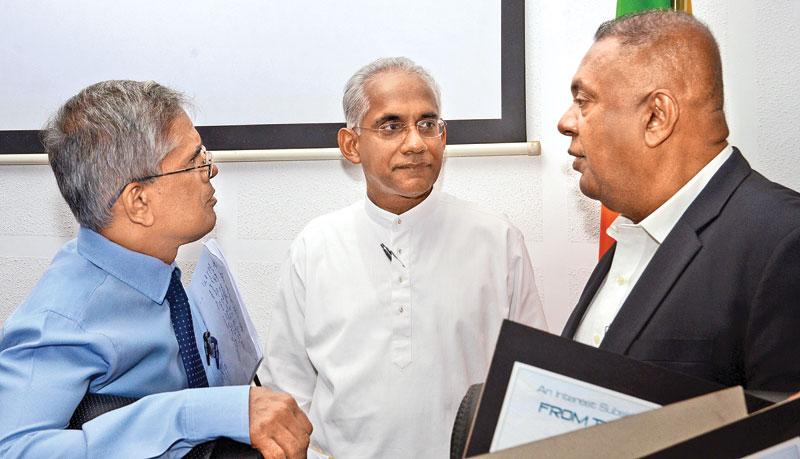
The Government last week declared an unexpected withdrawal of Telecommunication Levy on Internet data, and duty reductions on single cabs, mini trucks and motorcycles below the engine capacity of 150cc.bringing euphoria to a hard-pressed Sri Lankan community.
Rounding off the Yahapalana Government’s first two years of its reign Finance and Mass Media Minister Mangala Samaraweera said the 10 percent Telecommunication Levy on Internet data would be completely removed from September 1.
Announcing the loan project, Minister Samaraweera said, the Rs. 4.4 billion loan scheme - Divi Udana - with concessionary interest rates for eight segments, was mainly aimed at promoting entrepreneurship among our people. The government’s intention was to develop entrepreneurship among people in the country, thereby creating a large number of job opportunities. He added that our people are creative and we have a proud history of being a trading nation. Therefore, with financial support of this nature, the government is keen to promote a new generation of entrepreneurs.
“The ‘Budget 2017’ proposed to increase the Telecommunication Levy on Internet services from 10 to 25 percent. The Government decided to discard this proposal,” the Minister explained.
Government sources said the benefits that the businesses and entrepreneurs can get through this scheme is enormous as the interest of these loan schemes are minimum. For instance, the loan schemes aimed at the agricultural sector would support some large scale corporate companies as well as small-time entrepreneurs in the sector.
Leading commercial banks, including state and private banks in the country have extended their fullest cooperation to implement this project and the Treasury has already signed MOUs (Memorandum of Understanding) with several banks. Banks have been given all the operational guidelines to successfully carry out the loan scheme, according to Finance Ministry officials.
While the government was taking measures to promote entrepreneurship and create job opportunities among youth, the private sector is also making progress with introducing new entrepreneurship concepts to the Lankans.
The world’s largest peer-to-peer network of entrepreneurs - Entrepreneurs’ Organisation (EO) announced their arrival to Sri Lanka with the unveiling of the EO Sri Lanka Chapter in Colombo, last week.
The EO says, “Colombo has the potential to be a rapidly a growing city on all fronts, industries, infrastructure and education. We are gaining international prominence, and now is the time to nurture the entrepreneurial spirit, to grow ourselves both, personally and professionally, and this will be instrumental in our country’s economic growth.”
Meanwhile, speaking to a group of industrialists of the Ceylon National Chamber of Industries at the Galadari Hotel, Colombo, on Thursday, President Maithripala Sirisena said, he decided to set up the National Economic Council to accelerate economic development and strengthen the national economy. Increase of export revenue, development of indigenous Industries and local agriculture and fulfilling government’s obligations for industrial development in a more expeditious manner are other matters that warranted the setting up of such a body.
Commending the role the industrialists and other entrepreneurs of the country has played, the President said, ‘protection and strengthening of indigenous industries and local entrepreneurs are the government’s prime responsibilities.’
The government’s contribution to the development of indigenous industries, especially, the small and medium scale industries is far from satisfactory. Similarly, one cannot be happy with the assistance rendered to the indigenous industrialists by this government during the past 2 1/2 years. “We will initiate a program to strengthen and provide a roadmap to develop indigenous industries including small scale and medium scale industries.
Last week the Cabinet approved the proposal to set up the National Economic Council. It was established after extensive discussions with the Asian Development Bank, World Bank, IMF and local Economists, including those domiciled in foreign countries.
Certain unscrupulous elements have poisoned the minds of the business community in urban areas by injecting a sense of fear into their minds.
A misleading disinformation campaign too was launched. We will never enter into any free trade agreements with foreign countries to the detriment of the local business community. Even those highly developed countries as well as middle income countries have signed free trade agreements. If ever we sign any free trade agreements in the future, it will be only to strengthen our economy with no threat to the local industries, the President assured.
At present, our foreign trade is as low as 10% of the gross national income. Manufactured goods for local use as well as for export should be of high quality to compete in the international market.
The National Economic Council will certainly entertain your ideas or suggestions and wishes to work in close liaison so that the indigenous industries could be strengthened, the President said.
The President expressed concern over the sorry state of certain local industries, the survival of some of which is in jeopardy. The government is fully committed to develop the national economy while strengthening the small scale and medium scale business enterprises, as well as the mega enterprises.
While the President took time off to explain to the business community the government’s plans on promoting local industries, Prime Minister Ranil Wickremesinghe travelled to Matara to participate in several flood relief programs and inspect the progress of relief and compensation measures. Speaking at a public meeting, the PM has said the government needs Rs. 109 billion to repair the damage caused by the recent spate of floods and landslide in the south west of the island. The budgetary allocation for the reconstruction is about Rs. 60 billion and the government has to find the balance money to complete the reconstruction program.
